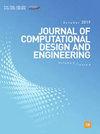Data-driven intelligent computational design for products: method, techniques, and applications
IF 6.1
2区 工程技术
Q1 COMPUTER SCIENCE, INTERDISCIPLINARY APPLICATIONS
引用次数: 0
Abstract
Data-driven intelligent computational design (DICD) is a research hotspot that emerged under fast-developing artificial intelligence. It emphasizes utilizing deep learning algorithms to extract and represent the design features hidden in historical or fabricated design process data and then learn the combination and mapping patterns of these design features for design solution retrieval, generation, optimization, evaluation, etc. Due to its capability of automatically and efficiently generating design solutions and thus supporting human-in-the-loop intelligent and innovative design activities, DICD has drawn the attention of both academic and industrial fields. However, as an emerging research subject, many unexplored issues still limit the development and application of DICD, such as specific dataset building, engineering design-related feature engineering, systematic methods and techniques for DICD implementation in the entire product design process, etc. In this regard, a systematic and operable road map for DICD implementation from a full-process perspective is established, including a general workflow for DICD project planning, an overall framework for DICD project implementation, the common mechanisms and calculation principles during DICD, key enabling technologies for detailed DICD implementation, and three case scenarios of DICD application. The road map can help academic researchers to locate their specific research directions for the further development of DICD and provide operable guidance for the engineers in their specific DICD applications.数据驱动的产品智能计算设计:方法、技术和应用
数据驱动的智能计算设计(DICD)是在人工智能快速发展的背景下出现的一个研究热点。它强调利用深度学习算法提取和表示隐藏在历史或虚构的设计过程数据中的设计特征,然后学习这些设计特征的组合和映射模式,用于设计方案的检索、生成、优化、评估等。由于能够自动有效地生成设计解决方案,从而支持人在环的智能和创新设计活动,DICD已经引起了学术界和工业界的关注。然而,作为一门新兴的研究课题,许多尚未探索的问题仍然限制了DICD的发展和应用,如具体的数据集构建、与工程设计相关的特征工程、在整个产品设计过程中实现DICD的系统方法和技术等。为此,从全流程的角度建立了系统的、可操作的DICD实施路线图,包括DICD项目规划的一般工作流程、DICD项目实施的总体框架、DICD实施过程中的通用机制和计算原则、具体实施DICD的关键使能技术和三种应用场景。该路线图可以帮助学术研究人员为DICD的进一步发展找到具体的研究方向,并为工程师在具体的DICD应用中提供可操作的指导。
本文章由计算机程序翻译,如有差异,请以英文原文为准。
求助全文
约1分钟内获得全文
求助全文
来源期刊

Journal of Computational Design and Engineering
Computer Science-Human-Computer Interaction
CiteScore
7.70
自引率
20.40%
发文量
125
期刊介绍:
Journal of Computational Design and Engineering is an international journal that aims to provide academia and industry with a venue for rapid publication of research papers reporting innovative computational methods and applications to achieve a major breakthrough, practical improvements, and bold new research directions within a wide range of design and engineering:
• Theory and its progress in computational advancement for design and engineering
• Development of computational framework to support large scale design and engineering
• Interaction issues among human, designed artifacts, and systems
• Knowledge-intensive technologies for intelligent and sustainable systems
• Emerging technology and convergence of technology fields presented with convincing design examples
• Educational issues for academia, practitioners, and future generation
• Proposal on new research directions as well as survey and retrospectives on mature field.
 求助内容:
求助内容: 应助结果提醒方式:
应助结果提醒方式:


